#Hortense de Beauharnais
Text
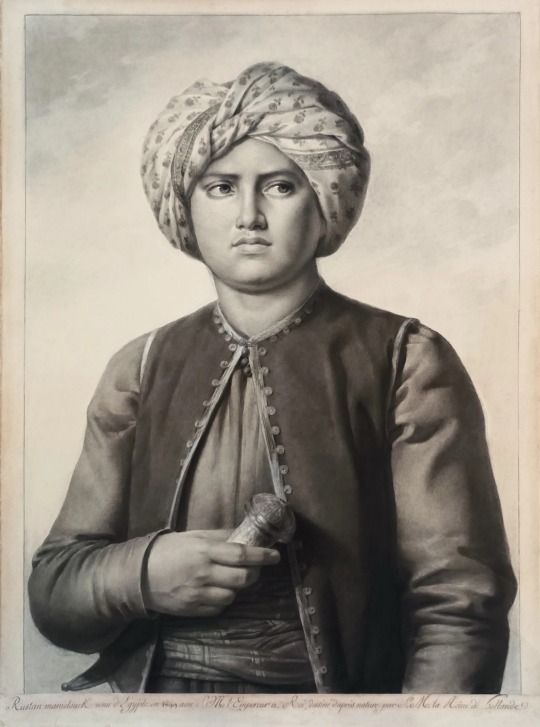
I found this neat portrait of Roustam Raza made by Hortense de Beauharnais! Circa 1800s
Roustam was Napoleon’s bodyguard and valet, and Hortense was Napoleon’s stepdaughter. Roustam was an Armenian Mameluke in Egypt, originally from Tbilisi. He became employed by Napoleon during the Egypt campaign in 1799, following him back to Europe, and remained by his side until Napoleon’s abdication in 1814. He lived the rest of his life in France.
TEFAF Maastricht
#Roustam Raza#Hortense de Beauharnais#Roustam#Hortense#Charcoal#TEFAF#TEFAF Maastricht#maastricht#the Netherlands#napoleon#Napoleon’s family#napoleonic#napoleonic era#first french empire#french empire#art#19th century#napoleon bonaparte#women artists#women in art#auction#auctions
115 notes
·
View notes
Note
Hello taniatas, ur artwork is very beautiful and you are very talented. If you can, will you do an artwork of Hortense de Beauharnais?
Hello !! Thank yu so much !!
I hope you see art with Hortense de Beauharnais ! I really love her.. She's a great women with a difficult fate.
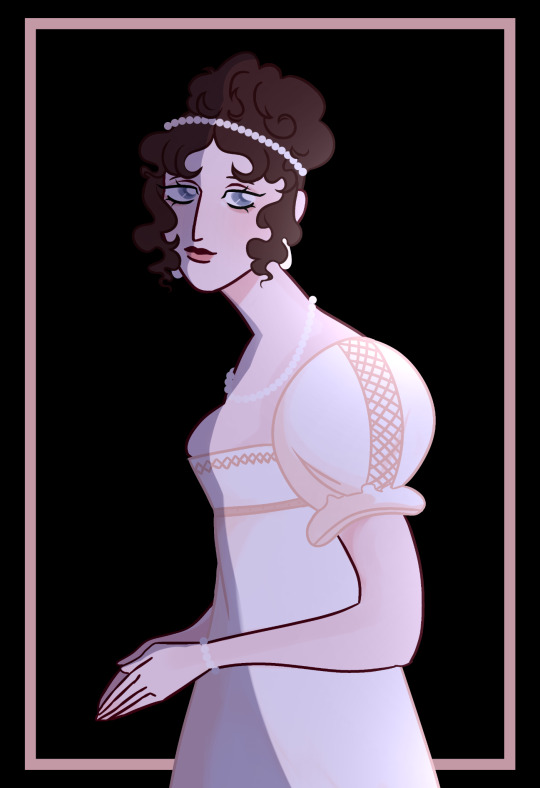
#⭐ response to request#french history#history art#art#digital illustration#taniata's art#hortense de beauharnais
70 notes
·
View notes
Note
What are your thoughts on Caroline Murat’s (alleged) affair with Junot?
It’s been a long time since I’ve browsed Laure Junot’s memoirs, but I recall her saying that Caroline had told her nothing had happened between them and Laure claiming to believe her, but her non-stop vitriol and overt hatred of Caroline throughout her memoirs makes me believe otherwise. I’ve seen it argued that Caroline’s affairs were motivated more by politics than by romance, and there may be something to this. Junot at the time of the alleged affair was the military governor of Paris and one theory is that Caroline wanted to wrap him around her little finger to use his political influence if necessary. Her affair with Metternich later on has been brought up as another instance of her cultivating a politically useful alliance (and realistically, it probably did have some impact on the Murat couple’s negotiations with Austria in 1813; she also continued corresponding with Metternich during her exile). The alleged affair with Junot also occurs during a period in Murat and Caroline’s relationship where Caroline was growing disenchanted because of Murat’s affairs (I’ve written a lot more about their complicated relationship here), and Hortense says in her memoirs that Caroline was during this period “now attracted to the charms of a pure liaison.” Lastly, during this period Caroline seems to have derived a certain satisfaction from charming the men of her rivals, probably just to prove she could do it; aside from Junot, Caroline also tried to lure away Charles de Flahaut from Hortense, out of what seems to have been nothing more than sheer jealousy over the fact that Hortense could get more attention than Caroline from one of Murat’s aide-de-camps. So, if the affair with Junot did happen, I think it was a combination of a revenge fling, political maneuvering, and Caroline just enjoying the thrill of being able to seduce a rival’s husband. Whatever happened between them apparently doesn’t seem to have lasted very long and there’s no indication at all that Caroline was ever really in love with Junot.
35 notes
·
View notes
Text




Rating: Cute!
Napoleons can be great companions for children. However, make sure your children are mature enough and don’t yank or manhandle Napoleons; they’re not delicate, but they can get hurt if you do something like pour hot wax on them or push them down a ravine or stab them with a sword worn at Austerlitz or something
But that’s not happening here! Just a Napoleon and his human companion dancing. The Napoleon isn’t enthusiastic about it, but if he really wanted to stop, he’s free to leave.
(Source: Napoleon and Josephine: A Love Story, 1987.)
71 notes
·
View notes
Text
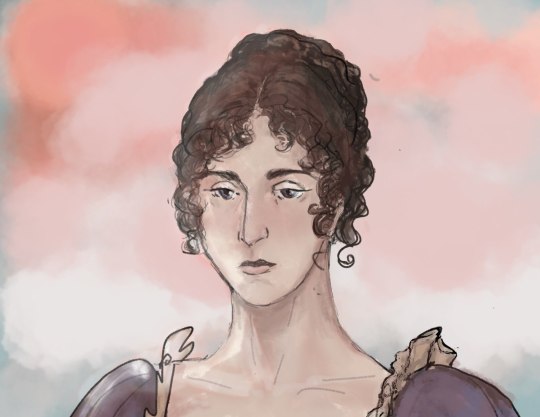
My dear Hortense Beauharnais
#history#french history#history art#napoleonic#napoleon bonaparte#napoleon#josephine beauharnais#josephine bonaparte#queen hortense#hortense de beauharnais
41 notes
·
View notes
Text
JACOBIN FICTION CONVENTION MEETING 36: THE GAME OF HOPE (2018)
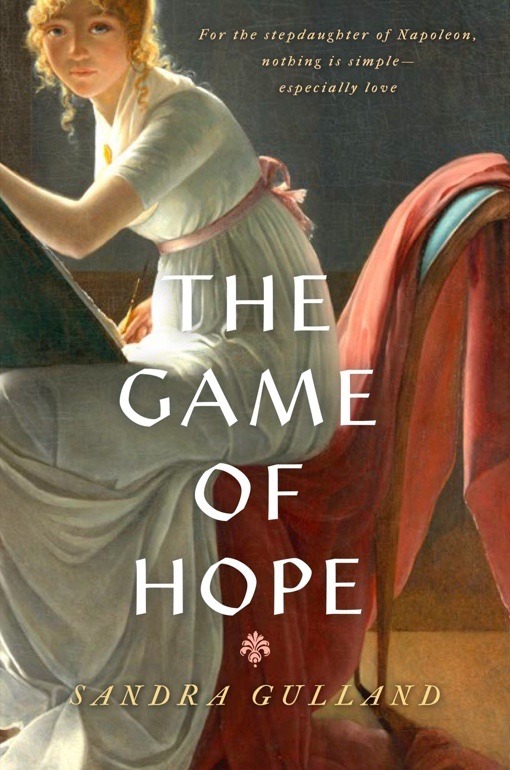
1. The Introduction
Well, hello there, Citizens and Neighbors! I’m alive and back with a review, as promised. (Very happy about it too because I missed you!)
Now, to cut to the chase, @josefavomjaaga was the first person who told me about the novel’s existence, which had me a bit intrigued already due to my constant search for new media to consume and review.
However, my dear friend @tairin helped seal the deal and officially put this particular piece onto my review bucket list, as a physical copy of the book (in Russian) was her present for my birthday last year. I read the book back then but, due to all the other reviews and personal life stuff, kept putting away this particular review.
Fortunately, I finally found free time to catch up on the piece and post it, so here we go.
Before we proceed, here’s a link for anyone who wants to download the book in English. As mentioned, it’s available in Russian too, but Russian-speaking members of my audience will need to purchase the epub or a physical copy to be able to read it. I’m not sure if it’s available in any other languages.
Also, this review is dedicated to @josefavomjaaga , @tairin and @frevandrest ! Okay, let’s. Fucking. Begin.
2. The Summary
“The Game of Hope” tells the story of Hortense de Beauharnais, Napoleon’s stepdaughter, and her coming of age journey, including crushes, rivalries, and her life at Madame Campan’s boarding school for girls.
Although I loathe Hortense with a passion, review material is review material and I was still intrigued by the premise, so let’s see how this premise plays out in the book!
3. The Story
Generally, I enjoy coming of age stories and YA novels and, luckily, this one is no exception. It is melodramatic, but it’s justified because Hortense is a teenager and a dramatic person, so her POV having melodrama is expected.
It’s a slice of life kind of story and most political events happen in the background but still realistically affect the characters, which is realistic and very neat!
Also, this is by far the only book where anti-Frev sentiments don’t give me an urge to flip the fuck out, since Hortense lost her father and almost lost her mother during Frev and is far too naive and young to understand politics! Of course she will think Frev is evil and of course she will believe that being noble would be enough to have her executed!
The pacing is great too. There are some time skips but the author clearly knew when to do them and when to slow down. Now complaints here.
If you are craving a story with typical teenage melodrama involving historical figures, then I guess it’s a book for you.
4. The Characters
I don’t like Hortense as a person here, but as a character she’s realistic and nuanced. She has the selfish and bratty nature that would stick way into adulthood, but she genuinely loves Eugene and her friends at the boarding school. Also her resentment towards her stepfather and the Bonaparte siblings is quite realistic, as from her point of view they’re just asses towards her mother for no reason.
Caroline Bonaparte starts off as a rude bitch (also thanks to Hortense incorporating her own bias), but luckily she becomes more and more nuanced along the way and becomes sort of a frenemy to Hortense. Caroline clearly doesn’t enjoy studying under Madame Campan and wants out of there. Perhaps due to my bias, or because we don’t see her POV, Caroline grew on me more than Hortense.
Eugene (I HAVE to mention him) appears later on in the story and, as expected, is an absolute cinnamon roll.
Josephine is idealized in the story by Hortense, but she isn’t flawless and keeps trying to find Hortense a husband in the beginning. However, she also helps Caroline and Joachim marry, which makes their treatment of her later on a fucking dick move.
Émilie, Hortense’s cousin and close friend, is slightly older and already married (not that unheard of back then), but is still a teenager going through the typical motions common for that age. She is more mature than Hortense and feels trapped in a loveless marriage with Captain Lavalette (no idea who that is).
Campan is very strict but genuinely cares about her students. I liked the part where she has The Declaration of the Rights of Man and Citizen attached to the back of a portrait of Marie-Antoinette and flips the portrait when inspection arrives. Simple, but quite clever!
5. The Setting
No complaints here! Gorgeous descriptions that are very much historically accurate, and Hortense’s POV is conveyed masterfully, which aids the story greatly.
6. The Writing
Simple yet beautiful, without diving too much into purple prose territory and doesn’t shy away from mentioning or implying normal things like periods or sex. I can sense some pearl clutching might happen, but personally I think these topics should be normalized so I don’t complain. Also, my copy graciously included translations of Italian phrases, which is doubly awesome!
7. The Conclusion
Overall, an excellent, overall accurate and believable story! I highly recommend it to anyone interested in learning more about Hortense or just looking for a Frev/Napoleonic coming of age story without too much action.
Alright, on this note, I’m concluding today’s meeting of Jacobin Fiction Convention. Stay tuned for updates, guys!
Love,
Citizen Green Pixel
#french revolution#frev#jacobin fiction convention#frev art#book review#a game of hope#hortense de beauharnais#eugene de beauharnais#josephine bonaparte#napoleon bonaparte#caroline murat#joachim murat#madame campan
54 notes
·
View notes
Text
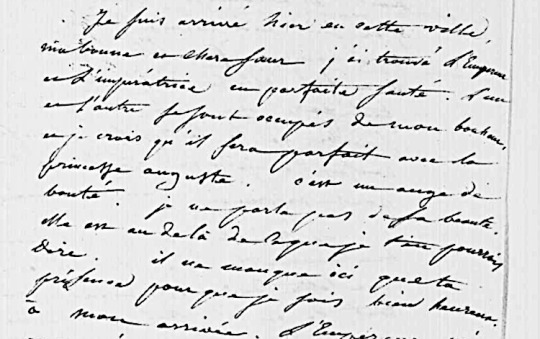
I arrived in this city yesterday, my dear and good sister, and found the Emperor and the Empress in perfect health. Both of them have attended to my happiness, and I believe that it will be perfect with Princess Auguste. She is an angel of kindness. I am not talking about her beauty, it is beyond anything I could tell you. The only thing missing here is your presence to make me truly happy [...]
Eugène de Beauharnais to his sister Hortense, Munich 11 January 1806
#napoleon's family#eugene de beauharnais#munich 1806#eugène's marriage#hey the original is far better than the mug indeed#auguste von bayern#hortense de beauharnais#you know sis both nappy and mum were very much occupied with this#but my bride and i have decided to make it work despite of them
39 notes
·
View notes
Text
Dinner with the divorced couple
It was in December of that year (1809) that Napoleon stayed in these rooms for the first time, just after his divorce from Josephine. The daughter of his ex-wife, Queen Hortense, recalled a visit to the Emperor on Christmas Day: “[He] was moving to the Trianon Palace and made us promise to pay him a visit. I accompanied my mother. It was a touching encounter. The Emperor wanted her to stay for dinner. As usual, he took the seat opposite hers. It was as if nothing had changed […] A profound silence prevailed. My mother could not bear to eat, and looked to be on the brink of fainting. The Emperor dried his eyes two or three times without saying anything, and we left immediately after dinner. "
—Chateau de Versailles website, Grand Trianon
33 notes
·
View notes
Text

Happy birthday to Hortense de Beauharnais!
April 10, 1783
60 notes
·
View notes
Text
Well I'll give Napoleon 6/10. They definitely took a more comedic approach to his character and parts of the movie came off as awkward because they tried too hard to sell this. I dislike what they did to Josephine. She was an intelligent, charismatic woman who was a great patroness of arts and introduced a great deal of plants (especially roses) into France. I don't like that they left out Eugene and Hortense as they also played important parts in his life. Most of his siblings and their becoming crowned royals was also ignored. I think the movie would have benefited from showing Napoleon as a child and his father's death and his early days as a soldier - if only for a brief prologue. Hopefully when Ridley puts out his 4 hour directors cut there is more of a development of Josephine as she deserved to be portrayed (Vanessa Kirby was admirable in her attempts to bring life to a thinly written character)
#Me#Personal#Liveblog#Napoleon#Napoleon 2023#Napoleon Bonaparte#Eugene de Beauharnais#Hortense de Beauharnais#Ridley Scott#Vanessa Kirby
10 notes
·
View notes
Text

#American history#Elizabeth Monroe’s jewelry#painting#portrait#Hortense de Beauharnais#Queen of Holland#James Monroe Museum and Memorial Library#Fredericksburg#Virginia
2 notes
·
View notes
Text

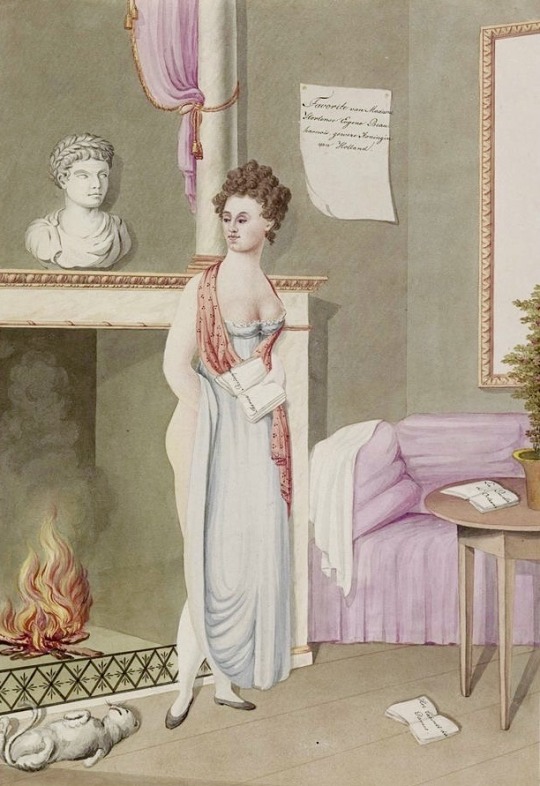
EMMA — 2020, dir. Autumn de Wilde
Queen Hortense de Beauharnais in her Private Apartments — 1810, anonymous
#Emma#hortense#Hortense de Beauharnais#Autumn de Wilde#napoleonic era#french empire#empire style#empire#19th century#19th century fashion#empire waistline#art#holland#queen#film#movie#film stills#movie stills#satire#1st empire#regency#the netherlands#royalty#fashion#historical fashion#women’s dress#women’s fashion#dress#1810#1800s
992 notes
·
View notes
Text
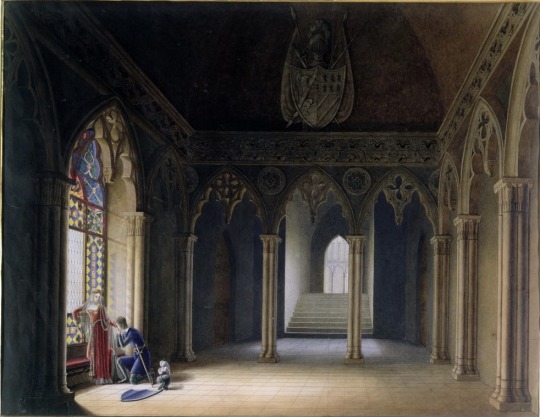
The Knight’s departure - Le départ du chevalier
by Hortense de Beauharnais
#knight#departure#hortense de beauharnais#château de compiègne#knights#art#watercolour#history#europe#european#medieval#middle ages#chivarly#chivalric romance#chivalric#romance#romantic#romanticism#france#french#castle#gothic#heraldry#court#courtly love#love#couple#interior#chevalier#chevaliers
55 notes
·
View notes
Text
Here’s Hortense contrasting Savary as Minister of Police with Fouché; apparently Savary was a piece of work in his own right.
The police system directed by the Duc de Rovigo also did a great deal of harm to the court ladies. His predecessor Fouché only harmed the Emperor when he obliged the latter to exile certain persons of the Faubourg Saint-Germain from Paris. Whenever a complaint was made to Fouché he would pretend to know nothing about it, blaming it on the Emperor’s impetuous temperament, on the fact that there were a hundred other branches of the police department which he could not superintend. In the end he would promise to wait for a favorable moment and have the sentence of banishment lifted. Later, it is true, he would request the Emperor to rescind the order which he had himself asked for, thus giving himself all the credit and letting his master take all the blame. He thus made followers for himself, but he never bothered about drawing-room gossip or petty social intrigues.
The Duc de Rovigo, on the other hand, seemed to do nothing else than collect the slightest bits of information about everyone’s private life. He acted as his own detective, wished to be the confidant of the ladies, stirred up quarrels between them, told stories which might or might not be true, spent all his morning making visits from one to another. If, in the Bois de Boulogne, a woman surrounded by her children and her friends happened to be speaking to a man and caught sight of the Duc de Rovigo she felt her reputation was lost. All our ladies did their best to avoid him.

#Savary#Hortense de Beauharnais#memoirs#Joseph Fouché#Napoleon#Napoleonic#history memes#Napoleonic memes
58 notes
·
View notes
Text
Hortense: Who wants to go out of the country on a road trip?
Alexandrine: Yes, I could drink legally!
Clementine: I could hang out with boys!
Oskar I.: I could hide from the consequences of my actions!
#History Meme#Napoleonic Wars#Hortense de Beauharnais#Alexandrine#Clementine#Oskar I.#Season 2#Queue post
9 notes
·
View notes
Text

On this day in 1763, the amazing woman Empress Josephine was born. I wish her to feel the love of those people who remember her.
In honor of this date, I drew her with Napoleon a small family.
#history#french history#history art#napoleonic#napoleon#napoleon bonaparte#josephine beauharnais#empress josephine#josephine bonaparte#queen hortense#hortense de beauharnais#eugene beauharnais
96 notes
·
View notes